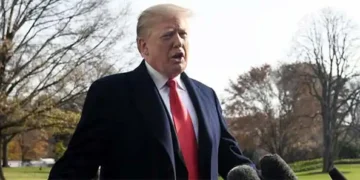Blitz Bureau
WASHINGTON: President Donald Trump has set his sights on abolishing the US Education Department and has said he’d prefer to put education policy in the hands of the states, a report filed by Adam Edelman and Tyler Kingkade for NBC News said.
But that, it said, may not be so simple, with state officials and lawmakers saying they’re wildly unprepared for such a huge undertaking.
NBC News had reported earlier that the White House is preparing an executive order to eliminate the agency, though the details of how that would work remain unclear.
Trump cannot unilaterally get rid of a federal agency without congressional approval, and his nominee for Education Secretary, Linda McMahon, agreed at her recent Senate confirmation hearing that they hope to present a plan that Congress will support.
An array of ideas At a Cabinet meeting on February 26, Trump reiterated his plans for major changes at the agency, saying that “we want to move education back to the states where it belongs.” Conservatives have for decades circulated an array of ideas on how to abolish or diminish the Cabinet-level agency – plans that include transferring key responsibilities within the department to other federal offices, as well as moving funds and oversight to the states.
Yet, in the absence of specifics, the White House’s broader plan has been met with confusion and big questions from state lawmakers and education officials from both parties who would be tasked with filling in the gaps most likely to arise if and when the department is ended or curtailed. While some state lawmakers are quietly attempting to develop modest contingency plans, most say they have no choice but to wait for the details to emerge and then scramble to make sure their states can absorb whatever additional responsibilities come their way.
A huge burden “There’s no solid [federal] plan, so we don’t even know what to plan for,” Connecticut State Rep. Maryam Khan, a Democrat and a former teacher and local board of education member, was quoted as saying in the NBC report. “If there’s just an implementation of something, all of a sudden, there’s no way any state can plan that quickly. There would be huge burdens on states to try to figure out something within a very small time frame,” she said.
The largest questions, according to the NBC News report, revolve around who would pick up many of the agency’s most crucial responsibilities – among them, the disbursement and oversight of funding for schools with extra needs, including schools with large populations ofWASHINGTON: President Donald Trump has set his sights on abolishing the US Education Department and has said he’d prefer to put education policy in the hands of the states, a report filed by Adam Edelman and Tyler Kingkade for NBC News said.
But that, it said, may not be so simple, with state officials and lawmakers saying they’re wildly unprepared for such a huge undertaking.
NBC News had reported earlier that the White House is preparing an executive order to eliminate the agency, though the details of how that would work remain unclear.
Trump cannot unilaterally get rid of a federal agency without congressional approval, and his nominee for Education Secretary, Linda McMahon, agreed at her recent Senate confirmation hearing that they hope to present a plan that Congress will support.
An array of ideas At a Cabinet meeting on February 26, Trump reiterated his plans for major changes at the agency, saying that “we want to move education back to the states where it belongs.” Conservatives have for decades circulated an array of ideas on how to abolish or diminish the Cabinet-level agency – plans that include transferring key responsibilities within the department to other federal offices, as well as moving funds and oversight to the states.
Yet, in the absence of specifics, the White House’s broader plan has been met with confusion and big questions from state lawmakers and education officials from both parties who would be tasked with filling in the gaps most likely to arise if and when the department is ended or curtailed. While some state lawmakers are quietly attempting to develop modest contingency plans, most say they have no choice but to wait for the details to emerge and then scramble to make sure their states can absorb whatever additional responsibilities come their way.
A huge burden “There’s no solid [federal] plan, so we don’t even know what to plan for,” Connecticut State Rep. Maryam Khan, a Democrat and a former teacher and local board of education member, was quoted as saying in the NBC report. “If there’s just an implementation of something, all of a sudden, there’s no way any state can plan that quickly. There would be huge burdens on states to try to figure out something within a very small time frame,” she said.
The largest questions, according to the NBC News report, revolve around who would pick up many of the agency’s most crucial responsibilities – among them, the disbursement and oversight of funding for schools with extra needs, including schools with large populations of impoverished students or schools with children with disabilities. impoverished students or schools with children with disabilities.

































